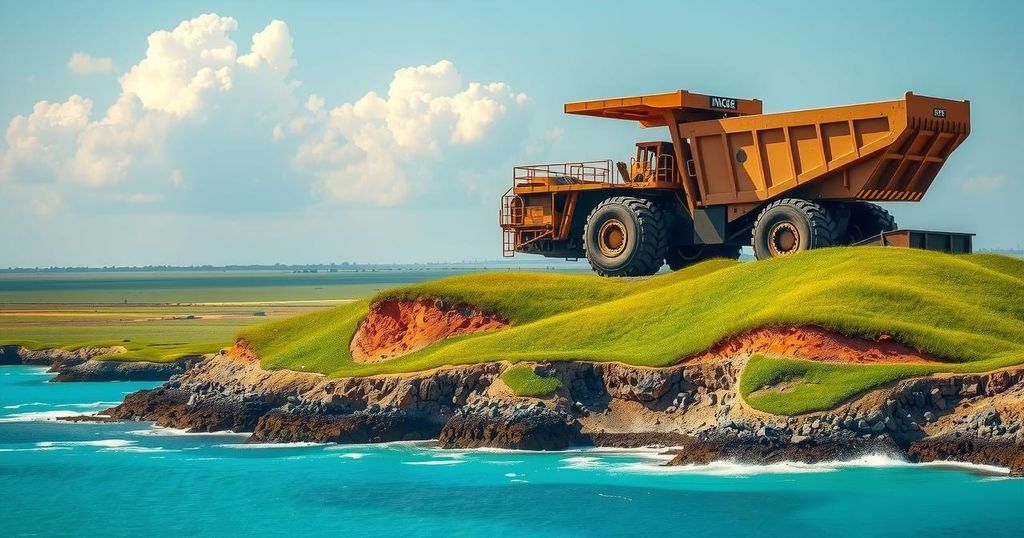The Environmental and Social Impact of Mining in Senegal’s Lompoul Region
The world’s largest mining dredger in Lompoul, Senegal, is rapidly depleting fertile lands essential for vegetable farming. Operated by Eramet, the project has displaced thousands of farmers and caused severe environmental degradation. Local communities are demanding compensation and the return of their land, while heightened calls for governmental oversight emphasize the need to balance mining activities with sustainable local development.
In Lompoul, Senegal, the world’s largest mining dredger has been rapidly consuming the fertile coastal land that is crucial for vegetable farming in the region. This extensive operation, involving the extraction of zircon for industrial use, has left a notable scar visible from space. The dredger processes thousands of tonnes of mineral sands per hour, moving forward on an artificial lake derived from water pumped from underground sources.
The mining project, operated by the French company Eramet, has resulted in the displacement of thousands of farmers over the past decade. While Eramet maintains it conducts responsible operations, local residents argue that their rich ecosystem is being destroyed, leading to significant hardships for the community. Gora Gaye, the mayor of a nearby district, expressed the despair felt by locals, stating that the project has caused profound disillusionment and economic setbacks for the region.
Following previously ignored protests from local farmers, pressure is mounting for a reevaluation of the mining practices, with Senegalese President Bassirou Diomaye Faye calling for increased transparency and oversight regarding social and environmental impacts of extraction activities. Faye’s administration, which took office last year, seeks to prioritize local benefits over foreign interests, specifically addressing concerns regarding the mine’s practices.
The mining activity began in 2014 under previous governance, despite promises of responsible management. Eramet claims to compensate displaced individuals at generous rates relative to government guidelines. Nevertheless, many affected locals, including hoteliers and family heads, argue the compensation cannot replace lost livelihoods and essential agricultural land crucial for their survival.
Local discontent is palpable as communities witness their fields become barren due to the environmental degradation caused by mining operations. Farmers are demanding the return of their land, asserting that the promises made following displacement have gone unfulfilled. As frustrations grow, public appeals to the government for intervention continue to amplify.
Despite Eramet’s claims of maintaining compliance with legal standards and generating significant revenue for Senegal, local farmers refute the assertion that they are benefiting from the operation. The call for a moratorium on mining efforts is gaining support among local leaders and residents, advocating for proper assessments of the environmental and social repercussions of this aggressive extraction operation.
In conclusion, the ongoing mining activities in Lompoul, led by Eramet, have stoked substantial public outcry over the environmental and social consequences stemming from the project. The demands for improved compensation, environmental protection, and the restitution of agricultural land highlight the broader conflict between large-scale mining interests and local community needs.
The mining operations in Senegal’s Lompoul region, overseen by Eramet, present a complex dilemma of economic development versus environmental preservation and community welfare. As local farmers faced displacement and degradation of their land, their calls for accountability and fair treatment underscore the urgent need for a reassessment of such large-scale industrial activities. The growing unity among affected communities, alongside governmental calls for oversight, reflects a shift towards prioritizing local interests amidst external financial pressures.
Original Source: www.france24.com




Post Comment